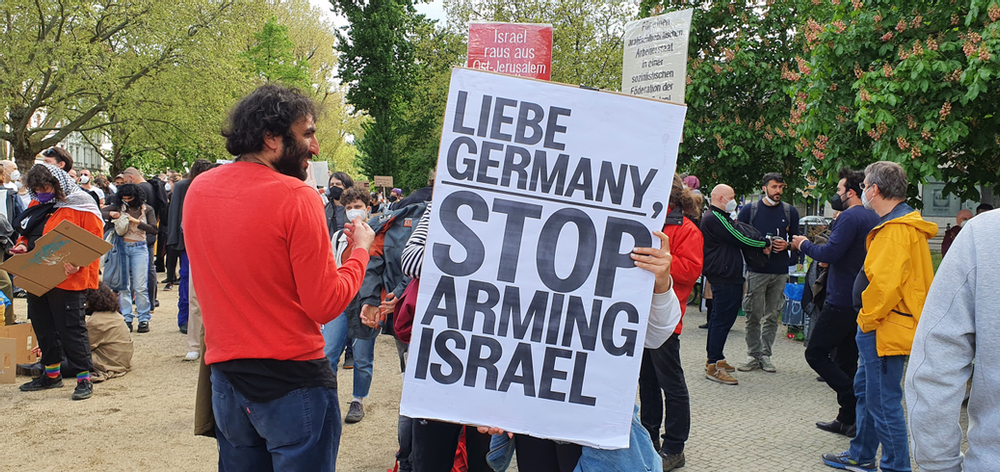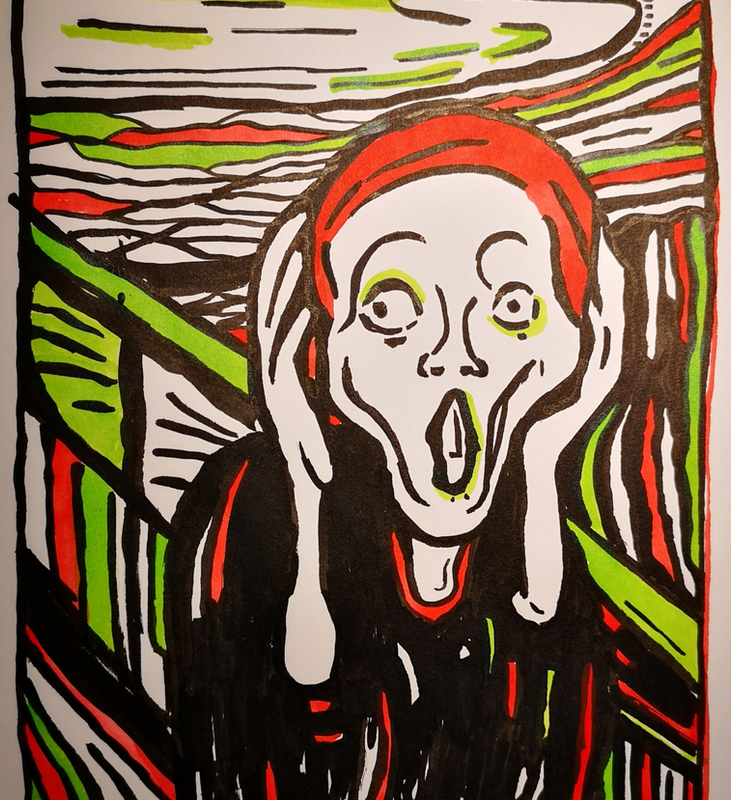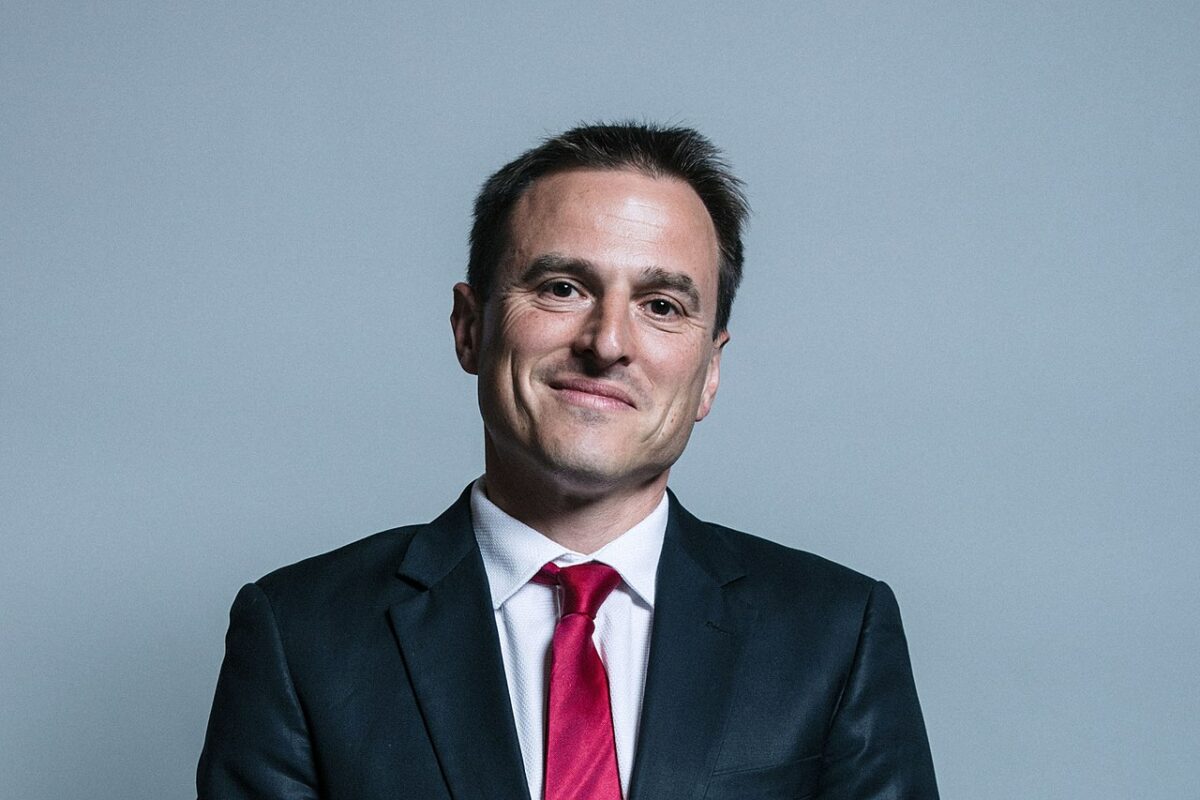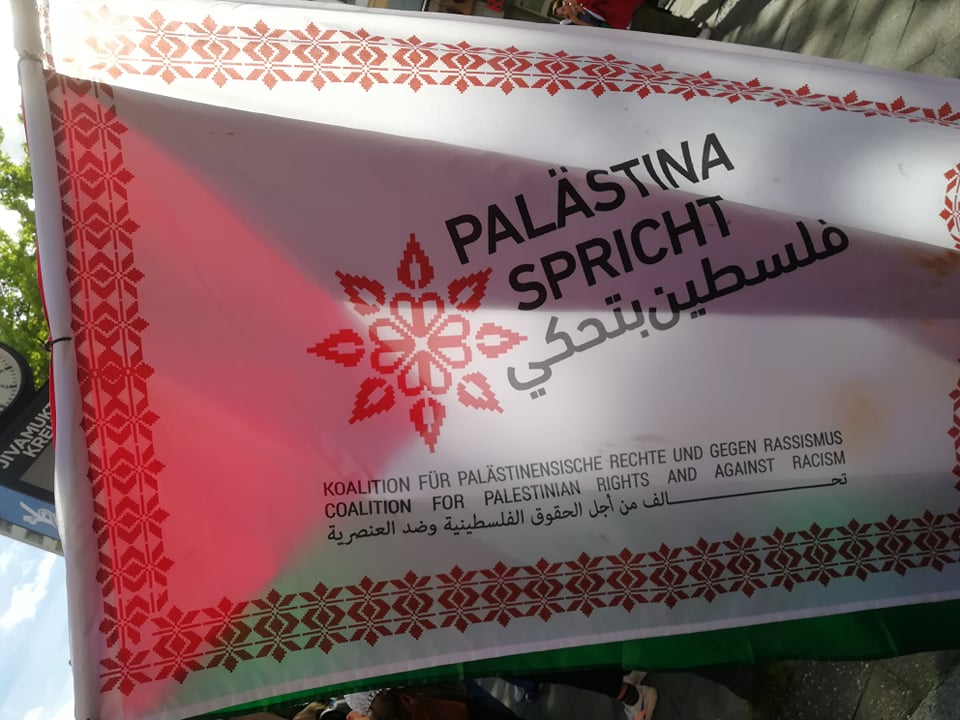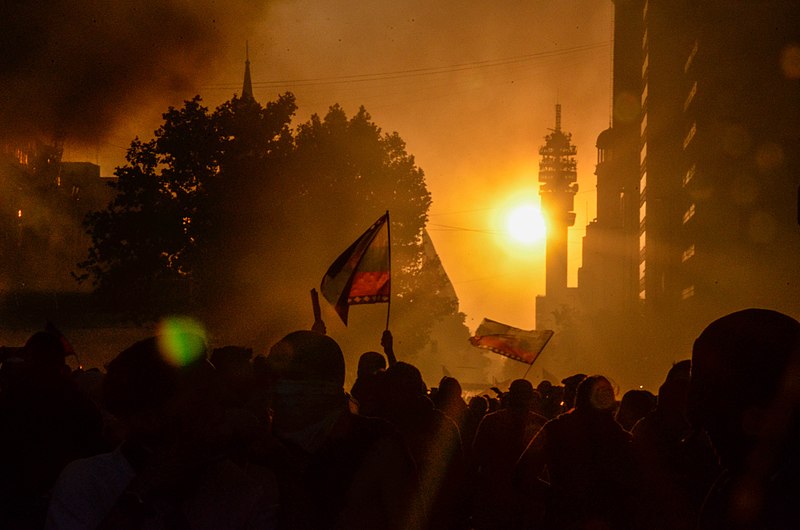Question: How is the bombing of Gaza being discussed in Germany
My sympathy goes out to all those who have lost loved ones and friends in Israel and Palestine. In the current escalation, but also as a result of occupation and blockade over the last years.
At the same time, I know that grief and compassion are not enough to understand the recent escalation.
After the crimes of German fascism and the Holocaust, a left position can only be one that vehemently fights every form of discrimination, exclusion and racism. A position that consistently opposes antisemitism – in general (mostly antisemitic crimes come from the right) and also against attacks like those on Synagogues like in Gelsenkrichen- , anti-Roma Racism, anti-Muslim racism and every other form of racism.
A left position can only be a universalist one. That is, a position that defends human rights for all people – regardless of where they live.
A left position must be internationalist and emancipatory. It starts from the self-activity of people as the decisive means for social change.
A left position must always take as its starting point the critique of the actions of its own ruling class.
A left position has to be consistently against war.
The German government and media
The German government stands firmly by the Israeli government.
Heiko Maas tweeted on Thursday: “Hamas has caused the latest escalation by firing over 1000 rockets at Israeli cities. Those who act so recklessly also bear responsibility for the appalling humanitarian consequences. Israel defends itself because it has to.”
An Israeli friend wrote to me: “This is incitement to violence! Israeli media and politics openly quoting foreign politicians saying‚ ‘Israel’s right to self defence‘, is a carte blanche to bomb Gaza and refuse ceasefire talks.”
This is also the main position in mainstream media in Germany.
Positions in Die LINKE
There are different reactions in DIE LINKE.
There is a minority taking a similar position to Heiko Maas.
The main position is to take a balance between both sides and be against the violence of all sides.
This can lead to speechlessness in the face of the asymmetry of war.
I was positively surprised by the statement of the student association SDS, which took as its starting point the current escalation of forced evictions in Sheikh Jarrah and thus the structural violence that characterises the situation in Israel and Palestine. They wrote:
“As leftists, we are always on the side of the oppressed. We fight against all forms of racism, no matter who it affects. We want a good life for all in justice and peace. That is why we demand an immediate stop to the evictions as well as to the construction of further settlements. We demand a ceasefire. Because those who suffer from escalation are the populations in the whole region. We call for an end to discriminatory and racist laws. And we call for strengthening those who fight for peace and justice in Israel and Palestine. By not remaining silent, but by taking a stand.”
This is the right position to take. From here we have to criticize the support our government gives to the war.
Question: 2 years ago today (15th May), the German Bundestag passed a resolution against the Boycott, Divestment and Sanctions (BDS) campaign. What are the various responses of Die LINKE to the Bundestag resolution?
The aim of this resolution is to silence criticism of the right-wing Israeli Government, to silence Palestinian voices and to silence critical jewish-Israeli voices.
It aims to silence criticism of the federal government supporting the right wing Israeli Government.
This is not forced upon the German government by something like a ‘Zionist lobby’. This is done in full consciousness by the German ruling class and it has to do with their own interest as an imperialist actor.
The debate about BDS was preceded by a resolution in the Bundestag against antisemitism.
In January 2018, the CDU/CSU, SPD, Greens and FDP introduced a joint motion on anti-Semitism in the Bundestag, which – in addition to positions that could be approved – blames Muslim migrants in particular for strengthening antisemitism in Germany. The motion also condemns the BDS campaign.
The AfD, which wants to hide its fascist wing and its antisemitism, was not attacked in the motion and could easily agree to it, since the motion assigned the main responsibility for antisemitism in Germany to Muslim migrants in particular.
For that reason, DIE LINKE did not vote in favour, but abstained, because it supported the other positions in the fight against antisemitism.
The initiative for the BDS motion clearly came from the right-wing spectrum of parliament. In April 2019 the FDP wrote a motion to condemn BDS, then the AfD put up a motion to ban BDS.
In May an inter-factional motion by the CDU/CSU, SPD, FDP and Greens under the title “Resolutely confronting the BDS movement – combating anti-Semitism” was passed by the Bundestag.
It claims that the BDS call “in its radicalism leads to the branding of Israeli citizens of the Jewish faith as a whole”. It says: “the patterns of argumentation and methods of the BDS movement are antisemitic”.
It adopts the IHRA’s working definition, which I have no time to go in to.
Position of Die LINKE
My position – and that of the majority of the left parliamentary group – was that this motion should be rejected.
My arguments:
- It is inadmissible to denounce BDS per se as ‘anti-Semitic’.
- DIE LINKE does not support the BDS campaign as other sister organisations do, but we respect it when people, out of criticism of the Israeli occupation policy, which has been condemned in numerous UN resolutions, support the BDS campaign.
- Here, criticism and protest is directed against the policies of the Israeli government, and not against Jews. This is legitimate and must not be slandered in a blanket way.
- Who benefits from equating criticism of the Israeli government with antisemitism?
- First of all, the right-wing government in Israel.
- The space for open debate has been narrowed far more dramatically in Israel itself. But also in Germany.
- Conversely, this also makes it more difficult for criticism of PA and Hamas corruption and policies to be articulated within the Palestinian population.
DIE LINKE voted NO, but it was a weak NO.
This is, because our own motion shared many of the false claims of the government’s motion.
I was against it, but this was a minority position.
It had a weaker formulation than the government motion, relating the criticism to Germany and not the international campaign, but continues to place BDS in the context of antisemitism.
I criticised this motion:
- Because it promotes the thesis that the call for a boycott would “brand Israeli citizens of the Jewish faith as a whole“ and thus promotes antisemitism.
- Because it did not express any criticism of the German government’s policy towards the Israeli occupation and settlement policy and human rights violation.
- It had no reference to the policies of the right-wing Nethanyahu government other than a general call for a peaceful solution to the conflict and the two-state solution.
- It did not have the intention of counteracting the desolidarisation with the Palestinians.
- It was not an offensive but a defensive reaction to the attacks from the right.
- And it was a fearful reaction, because it believed that one can thus evade the attacks from the right.
But far from it:
Effects of the BDS resolution
In the time surrounding the decision, there were several decisions that made the fatal effect clear:
- Cancellation of the account at the Bank for Social Economy for “Jewish Voice for Just Peace in the Middle East”.
- Peter Schäfer had to resign as director of the Jewish Museum.
- The Rosa Luxemburg Foundation was forced to cancel an event at the Kirchentag Dortmund with liberation theologian Ulrich Duchrow, Kairos Europe and Farid Esack, South African Muslim liberation theologian, activist of the anti-apartheid movement and representative of the BDS movement in South Africa.
- The event moved to a lawn outside the Kirchentag. Later the Kirchentag president apologized to Ulrich Duchrow.
But also:
- The Scientific service of the Bundestag took the Resolution apart.
- Excluding BDS-affiliated persons or groups from using the event solely because of expected undesirable expressions of opinion is therefore incompatible with Art.5 para.1 GG.28
- In particular, the resolution of the German Bundestag of 17 May 2019 – as outlined above – also does not constitute a basis that could justify such a restriction”.
- This position is even taken by the lawyer of the Bundestag in a court case against the Resolution as a reason not to deal with the lawsuit against it.
If this is the case, it proves my point from the beginning:
- The aim of this resolution is to silence criticism of the right wing Israeli Government
- To silence Palestinian voices and to silence critical jewish-Israeli voices.
- It aims to silence criticism of the federal government supporting the right wing Israeli Government.
Answers to Questions:
The Party committee of DIE LINKE decided on a declaration that is not perfect, but better than the statement of Susanne Hennig-Welsow and Janine Wissler the day before.
The one-sided and unambiguous positioning of the political establishment on the side of the right-wing Israeli government is not the position, as I perceive it, among the broad population. Certainly there is a minority that criticizes Israel on antisemitic grounds. That needs to be countered. But my experience is that people are empathetic against war and oppression.
One clear change is the emergence of a new Palestinian left, anchored in the migrant movements of recent years – such as Palestine Speaks – and linking up with Jewish leftists organized in the Jewish Voice or the Jewish Federation. These organize together to protest war and occupation, anti-Muslim racism and antisemitism. These organizations have managed to build connections with other, especially migrant, organizations and thus are able to better discuss the question of Palestine. Already before the event, ‘Palestine Speaks’ had declared: “Just as we do not need the solidarity of those who abuse Palestine for their antisemitism, we do not need the solidarity of Turkish fascists who want to poison our struggle. We are absolutely in solidarity with the Kurdish liberation struggle.” Only the German left, with a few exceptions, stands apart from this new leftist movement.
The debate of the Jerusalem Declaration is very helpful. I also want to recommend the study by Peter Ullrich on the IHRA Definition that was published by the Rosa Luxemburg Foundation.
What should we do now?
My suggestion is that the German Left takes these positions on the following points:
- Supports the goals of Palestinian civil society – an end to the occupation and construction of settlements in the Palestinian territories, the removal of the separation wall, the recognition of equal rights for Arab-Palestinian citizens of Israel and the right of return for Palestinian refugees supported by resolutions of the UN General Assembly and the UN Security Council.
- In Germany, die LINKE does not support the Boycott, Divestment, Sanctions campaign, but rejects the characterisation of the BDS campaign as antisemitic and clearly opposes space bans and other forms of repression against the campaign, as this massively restricts freedom of expression in human rights discourse.
- takes a firm stand against antisemitism, anti-Muslim racism, anti-Roma racism and any other form of racism and exclusion. It also does so in the case, when it identifies antisemitism in individuals acting within the BDS spectrum. The German Left bases its arguments on these statements or facts, not on their support for BDS.
- openly and clearly says no to war
Finally I want to stress, that it is important to create spaces for common debate and action. And I invite you to join DIE LINKE, take part in our debates and make DIE LINKE better.
